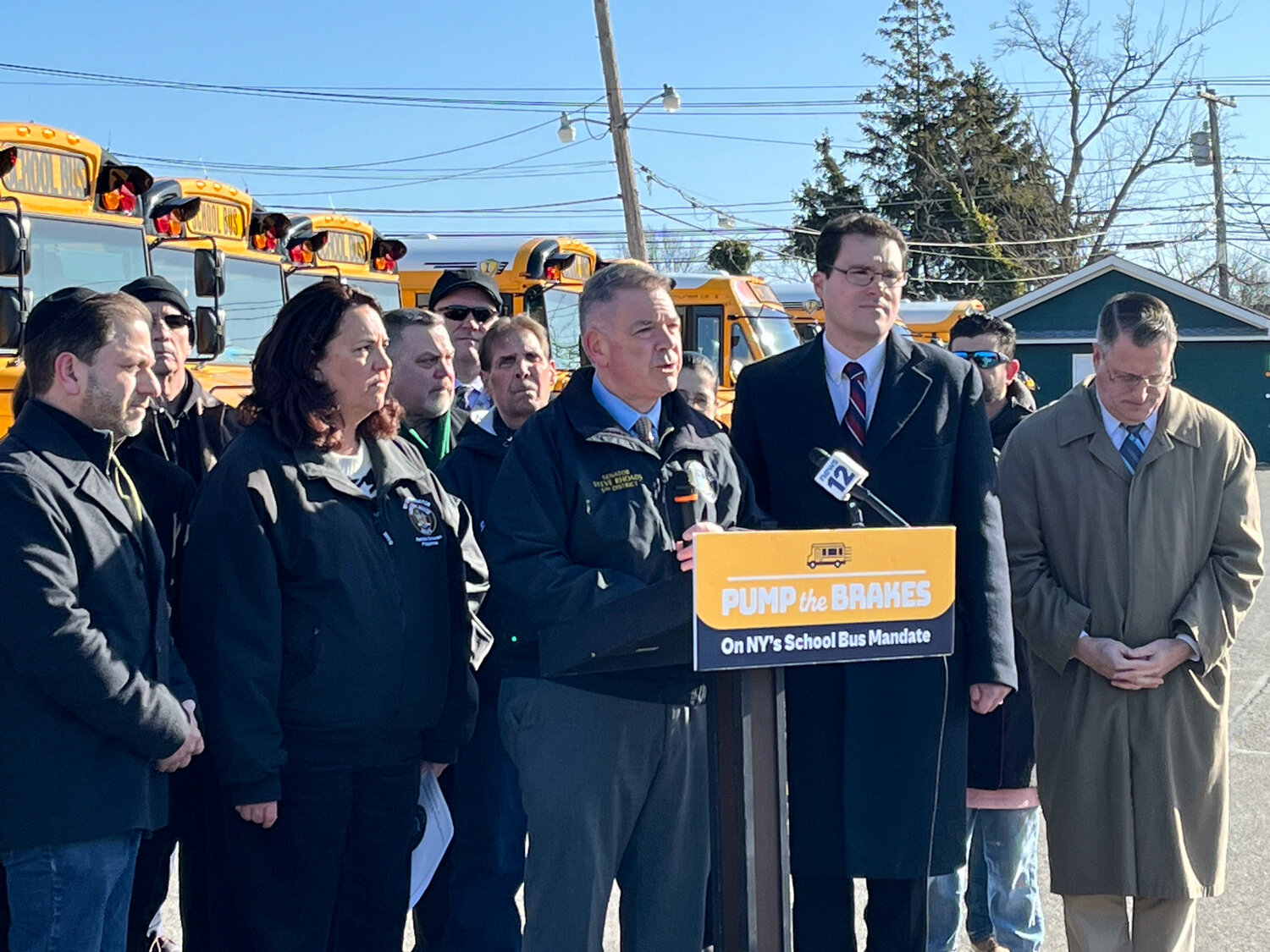Local electeds want to ‘pump the brakes’ on state's electric bus mandate
A number of state electeds are calling on the governor to slow down her plans to make school buses electric by 2035 — something they say could have a devastating impact on district finances.
Some like state Sen. Steve Rhoads and state Sen. Patricia Canzoneri-Fitzpatrick joined Assemblyman John Mikulin and other officials handling fire and safety at schools at the Levittown Public School bus yard in Wantagh last week hoping they can convince Gov. Kathy Hochul to extend the deadline for that mandate deeper into the future to ensure it’s affordability for communities like those in Nassau County.
“There’s nothing magical about this New York state school bus mandate,” Rhoads said.
Citing the main character from the popular children’s television animated series “The Magic School Bus,” Rhoads said “even Ms. Frizzle herself would agree that this burdensome mandate takes chances, makes mistakes, and gets messy.”
The state’s current budget mandates all school buses must have no environmental impact through emissions by 2035, with districts only allowed to purchase electric school buses by mid-2027.
The idea, according to Hochul, is to reduce greenhouse gas emissions by 85 percent by 2050. The state’s environmental conservation department blames the transportation sector overall as one of New York’s largest sources of emissions, which contributes to climate change impacts such as increased heat waves, sea level rise and flooding.
“Old school buses are putting children’s health at risk, spewing toxic fumes and pollutants into the air that are proven to have negative health impacts,” Hochul’s office said, in a statement. “After New York voters approved an Environmental Bond Act that allocated $500 million for zero-emission school buses, Gov. Hochul is working with communities across New York to allocate these funds and ensure they are fully utilized.”
But Rhoads says the mandate does not account for the logistical and financial challenges that school districts, bus companies and power companies will face in implementing the plan. A new, full-sized electric bus costs as much as $450,000 — triple the price of a conventional.
With some 45,000 school buses on the road in the state, Rhoads says the full conversion by 2035 would cost in the neighborhood of $20 billion.
The Levittown school district — with a fleet of 80 buses — is in the beginning stages of the mandate. Superintendent Todd Winch said it would cost the district as much as $32 million to replace their fleet, and will purchase its first electric bus this year.
“We don’t replace a whole fleet for maybe 20 years, but now they’re asking us to replace the whole fleet from 2027 to 2035,” Winch said. “Now you’re talking about a very short time period to replace the whole fleet, which would be very, very difficult.”
In addition, the Levittown bus yard would require 40 charging stations, each one costing between $30,000 and $50,000, Winch added.
The state has offered to help, but Canzoneri-Fitzpatrick said the $500 million offered would only cover a little more than 1,200 buses. The rest would have to paid for by local taxpayers — and that’s not even including infrastructure and charging stations.
“Where’s the rest of that money coming from?” the state senator asked. “You, from the taxpayers, because that’s what the school districts will be forced to do to meet this mandate.”
But the current high costs associated with electric buses are expected to come down over time, Hochul said. The New York State Energy Research and Development Authority announced last September it believes the price of an electric school bus should be on-par with a gasoline-powered bus as early as 2027 thanks to advances in battery technology, more manufacturing, as well as lower fuel and maintenance expenses.
The state authority also is expected to provide planning and financial support to help cover the cost of clean buses, Hochul said, such as incentive programs and rebates of up to $2,000 for new electric vehicle purchases.
Bob Vecchio, the executive director of the Nassau-Suffolk School Boards Association, said the switch to electric buses is “the grand-daddy of unfunded mandates” that he’s seen in his decades-long experience with school boards.
“If you are in negotiation with a transportation provider for a contract right now,” Vecchio said, “you’re going to be paying those escalated costs today for the promise of higher expenses tomorrow.”
Safety is also a concern, according to Nassau County chief fire marshal Michael Uttaro, who is concerned about the intensity of electric vehicle fires that have been depicted on social media.
“Allow us to work with professionals in the industry, the EV industry, and other infrastructure experts to find a way to control these fires and find a way to suppress these fires,” he said.
Rhoads calls Hochul’s mandate a rushed plan, adding there needs to be a measured and thoughtful approach that considers practical and financial concerns.
“We all want to see a greener future,” the state senator said. “There is no question about that. But we have to make sure that if our goal is providing affordable, safe, and reliable transportation to our students, we have to make sure we have a plan which gets us to that future, but still accomplishes that primary goal.”

 50.0°,
Overcast
50.0°,
Overcast 




